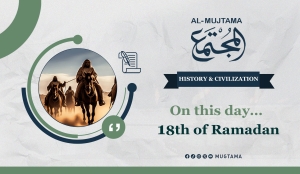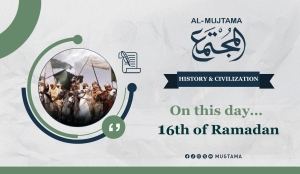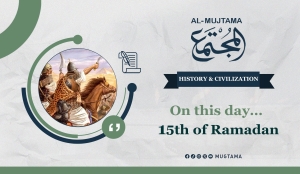Nada Gamal
Significant Events on the 18th of Ramadan
March 18, 2025Death of Khalid ibn al-Walid (Sword of Allah): On the 18th of Ramadan, 21 AH (August 20, 642 CE )
Pledge of Allegiance to Hasan ibn Ali for the Caliphate: On the 18th of Ramadan, 40 AH (January 24, 661 CE)
Yusuf ibn Tashfin Unites Muslims in Al-Andalus: On the 18th of Ramadan, 484 AH (October 24, 1091CE)
Ottoman Army Enters Aleppo: On the 18th of Ramadan, 1256 AH November 10, 1840, CE
Establishment of the Almohad State: On the 18th of Ramadan, 539 AH (March 24, 1145CE)
- Death of Khalid ibn al-Walid (Sword of Allah): On the 18th of Ramadan, 21 AH (August 20, 642 AD), Khalid ibn al-Walid, renowned for his conquests over the Persian and Roman empires, passed away. He dedicated his life to jihad in the path of Allah.
- Pledge of Allegiance to Hasan ibn Ali for the Caliphate: On the 18th of Ramadan, 40 AH (January 24, 661 AD), Hasan ibn Ali was pledged allegiance for the caliphate after his father's assassination.
- Yusuf ibn Tashfin Unites Muslims in Al-Andalus: On the 18th of Ramadan, 484 AH (October 24, 1091CE), commander Yusuf ibn Tashfin successfully united the Muslims in Al-Andalus, ending the division among the Taifa kings.
- Ottoman Army Enters Aleppo: On the 18th of Ramadan, 1256 AH, (November 10, 1840, CE) the Ottoman army entered Aleppo after expelling the Egyptian army led by Ibrahim Pasha, following the Treaty of London.
- Establishment of the Almohad State: On the 18th of Ramadan, 539 AH, (March 24, 1145CE), the Almoravid state in the Maghreb ended, and the Almohad state was established. The Almohads, originating from the Zanata tribes, ruled the Maghreb and Al-Andalus between 1121 AD and 1269 AD, with their capital in Marrakech.
Significant Events on the 17th of Ramadan
March 17, 2025The Battle of Badr
On the 17th of Ramadan in the year 2 AH (624 CE)
Martyrdom of Imam Ali Ibn Abi Talib
On the 17th of Ramadan, 40 AH (January 24, 660 CE)
Establishment of the International Islamic Charity Organization
On the 17th of Ramadan, 1404 AH June 6, 1984CE
The Battle of Badr
On the 17th of Ramadan in the year 2 AH (624 CE), the Battle of Badr took place. This was the first major battle between the Muslims and the Quraysh of Mecca. The Muslim forces, led by the Prophet Muhammad (peace be upon him), achieved a decisive victory, significantly boosting the morale of the Muslim community and establishing their presence in the region.
Read also :
From Badr to Al-Aqsa Flood... How have Muslims dealt with the POWs?
The Death of Aisha bint Abu Bakr
On the 17th of Ramadan, Aisha bint Abu Bakr, the beloved wife of the Prophet Muhammad (peace be upon him), passed away. She was known for her knowledge, wisdom, and contributions to Islamic jurisprudence.
Martyrdom of Imam Ali Ibn Abi Talib
On the 17th of Ramadan, 40 AH (January 24, 660 AD), Imam Ali Ibn Abi Talib, the fourth Caliph of the Rashidun Caliphate, was martyred. Having embraced Islam early on, he participated in battles alongside the Prophet Muhammad (peace be upon him) and married the Prophet's daughter, Fatimah. He was renowned for his courage, eloquence, and oratory skills. Imam Ali was assassinated by the Kharijite Abdul Rahman Ibn Muljam Al-Himyari at the age of fifty-eight.
Establishment of the International Islamic Charity Organization
On the 17th of Ramadan, 1404 AH, the establishment of the International Islamic Charity Organization in Kuwait began following the approval of its basic law and the selection of its founding members.
Significant Events on the 16th of Ramadan
March 16, 2025The Death of Sayyida Aisha On the 16th of Ramadan in 58 AH (678 CE)
The Death of Khalid ibn al-Walid On the 16th of Ramadan in 21 AH (642 CE)
The Conquest of Aleppo On the 16th of Ramadan in 17 AH (638 CE)
The Siege of Constantinople On the 16th of Ramadan in 1094 AH (1683 CE)
The Birth of Ibn Khaldun On the 16th of Ramadan in 732 AH (1332 CE)
The Birth of Nur ad-Din Zangi On the 16th of Ramadan in 511 AH (1118 CE)
- The Death of Sayyida Aisha On the 16th of Ramadan in 58 AH (678 CE), Sayyida Aisha, the Mother of the Believers and wife of the Prophet Muhammad (peace be upon him), passed away. She was buried in Al-Baqi' at the age of sixty-seven.
- The Death of Khalid ibn al-Walid On the 16th of Ramadan in 21 AH (642 CE), Khalid ibn al-Walid, known as "The Sword of Allah" and one of the greatest military commanders in Islamic history, passed away. He played a crucial role in the early Islamic conquests.
- The Conquest of Aleppo On the 16th of Ramadan in 17 AH (638 CE), Muslim forces led by Abu Ubaidah ibn al-Jarrah and Khalid ibn al-Walid conquered the city of Aleppo, significantly expanding the Islamic state into Syria.
- The Siege of Constantinople On the 16th of Ramadan in 1094 AH (1683 CE), the Ottoman Empire began its second siege of Constantinople (modern-day Istanbul). This siege was a key event during the Great Turkish War between the Ottoman Empire and the Holy League.
- The Birth of Ibn Khaldun On the 16th of Ramadan in 732 AH (1332 CE), the renowned historian and philosopher Ibn Khaldun was born. He is best known for his work "Muqaddimah," which laid the foundations for various fields of study, including sociology and historiography.
- The Birth of Nur ad-Din Zangi On the 16th of Ramadan in 511 AH (1118 CE), the Muslim ruler and military leader Nur ad-Din Zangi was born. He played a significant role in the early stages of the Crusades and in the defense of Muslim territories against the Crusaders.
Significant Events on the 15th of Ramadan
March 15, 2025The Ottoman Empire's Victory Over Russia On the 15th of Ramadan 1224 AH (24th October 1809),
The Birth of Hasan ibn Ali On the 15th of Ramadan 3 AH (625 CE),
The Battle of Ain Jalut On the 15th of Ramadan 658 AH (1260 CE),
The Treaty of Hudaybiyyah On the 15th of Ramadan 6 AH (628 CE),
The Battle of Qadisiyyah On the 15th of Ramadan 15 AH (636 CE),
The Conquest of Rhodes On the 15th of Ramadan 53 AH (673 CE
The Ottoman Empire's Victory Over Russia On the 15th of Ramadan 1224 AH (24th October 1809), the Ottoman Empire defeated Russia in the Battle of Tatarija, killing 10,000 Russian soldiers.
The Birth of Hasan ibn Ali On the 15th of Ramadan 3 AH (625 CE), Hasan ibn Ali, the grandson of the Prophet Muhammad (peace be upon him) and the son of Ali ibn Abi Talib and Fatimah, was born. He is revered for his wisdom, piety, and leadership.
The Battle of Ain Jalut On the 15th of Ramadan 658 AH (1260 CE), the Battle of Ain Jalut occurred. Muslim forces, led by Sultan Qutuz and Baybars, achieved a significant victory against the Mongols, marking their first major defeat and halting their advance into the Muslim world.
Read also: Fall of the Abbasid Caliphate: A Reflection on the Causes and Consequences
The Treaty of Hudaybiyyah On the 15th of Ramadan 6 AH (628 CE), the Treaty of Hudaybiyyah was signed between the Prophet Muhammad (peace be upon him) and the Quraysh tribe of Mecca. This treaty was pivotal as it allowed Muslims to practice their faith without persecution and paved the way for the eventual conquest of Mecca.
The Battle of Qadisiyyah On the 15th of Ramadan 15 AH (636 CE), the Battle of Qadisiyyah took place. Muslim forces, led by Sa'd ibn Abi Waqqas, achieved a decisive victory over the Persian Empire, leading to the conquest of the Persian capital, Ctesiphon.
The Conquest of Rhodes On the 15th of Ramadan 53 AH (673 CE), Muslim forces led by Muawiyah ibn Abi Sufyan successfully conquered the island of Rhodes, further expanding the reach of the Islamic state into the Mediterranean region.
Significant Events on the 14th of Ramadan
March 14, 2025The Battle of Ajnadayn: On the 14th of Ramadan in 15 AH (636 CE)
The Conquest of Cyprus: On the 14th of Ramadan in 53 AH (673 CE(
The Death of Salah al-Din al-Ayyubi (Saladin): On the 14th of Ramadan in 589 AH (1193 CE(
The Death of Imam Ibn al-Jawzi: On the 14th of Ramadan in 597 AH (1201 CE (
The Battle of Ajnadayn
On the 14th of Ramadan in 15 AH (636 CE), the Muslim forces led by Khalid ibn al-Walid achieved a crucial victory against the Byzantine Empire at the Battle of Ajnadayn. This victory was pivotal in the expansion of the Islamic state into the Levant.
The Conquest of Cyprus
On the 14th of Ramadan in 53 AH (673 CE), Muslim forces led by Muawiyah ibn Abi Sufyan conquered the island of Cyprus. This significant achievement marked the expansion of the Islamic state into the Mediterranean region.
The Death of Salah al-Din al-Ayyubi (Saladin)
On the 14th of Ramadan in 589 AH (1193 CE), Salah al-Din al-Ayyubi (Saladin), the founder of the Ayyubid dynasty and the Muslim leader who recaptured Jerusalem from the Crusaders, passed away. He is remembered for his leadership, piety, and contributions to the Muslim world.
The Death of Imam Ibn al-Jawzi
On the 14th of Ramadan in 597 AH (1201 CE), the renowned Islamic scholar and preacher Imam Ibn al-Jawzi passed away. He was known for his prolific writing and contributions to Islamic thought and jurisprudence.
On this Day… 13th of Ramadan
March 13, 2025
The Battle of Buwaib
The Arrival of Umar ibn al-Khattab in Palestine and the Conquest of Jerusalem
The Martyrdom of Ottoman Sultan Murad I
The Pledge of Allegiance to Abd al-Rahman ibn Hisham for the Caliphate of Cordoba
The Outbreak of World War I
The Battle of Buwaib On the 13th of Ramadan in 13 AH (634 CE), the Muslim forces led by Al-Muthanna ibn Haritha fought and achieved a significant victory against the Persian Empire. This battle helped consolidate Muslim control over the region.
The Arrival of Umar ibn al-Khattab in Palestine and the Conquest of Jerusalem On the 13th of Ramadan in 15 AH (18th October 636 CE), Umar ibn al-Khattab arrived in Palestine after fierce battles, receiving the keys to Jerusalem and ensuring the safety of its people and their properties.
The Martyrdom of Ottoman Sultan Murad I On the 13th of Ramadan in 698 CE (15th November 1298 CE), Sultan Murad I was martyred after conquering Bosnia and Herzegovina. He achieved a decisive victory against a coalition of Serbs, Bosnians, Herzegovinians, Wallachians, and Moldavians at Kosovo, but was fatally stabbed by a Serbian soldier while inspecting the battlefield.
The Pledge of Allegiance to Abd al-Rahman ibn Hisham for the Caliphate of Cordoba On the 13th of Ramadan in 414 AH (28th November 1023 CE), Abd al-Rahman ibn Hisham was pledged allegiance as the Caliph of Cordoba, taking the title of al-Mustazhir Billah. His caliphate lasted for one month and seventeen days.
The Caliphate of Córdoba in Perspective
The Outbreak of World War I On the 13th of Ramadan, World War I is commemorated. Thirty countries participated in the war, which lasted four and a half years. The world was divided into two warring camps: one led by Germany, Austria-Hungary, and the Ottoman Empire, and the other by Britain, France, and the United States.
On this Day… 12th of Ramadan
March 12, 2025On this Day… 12th of Ramadan
The Muslim Army Enters Andalusia On the 12th of Ramadan in the year 92 AH (711 CE),
The Birth of Muhammad ibn Qasim On the 12th of Ramadan in the year 72 AH (692 CE),
The Battle of Hattin Preparations On the 12th of Ramadan in the year 583 AH (1187 CE),
----
The Muslim Army Enters Andalusia
On the 12th of Ramadan in the year 92 AH (711 CE), Tariq ibn Ziyad and his Muslim army entered the Iberian Peninsula (Andalusia) to begin the conquest of Spain. This marked the beginning of the spread of Islam in Western Europe.
The Birth of Muhammad ibn Qasim
On the 12th of Ramadan in the year 72 AH (692 CE), Muhammad ibn Qasim, the famous Muslim general who led the conquest of Sindh (modern-day Pakistan), was born. He is celebrated for his significant role in spreading Islam in the Indian subcontinent.
The Battle of Hattin Preparations
On the 12th of Ramadan in the year 583 AH (1187 CE), Salah al-Din al-Ayyubi (Saladin) began his preparations for the Battle of Hattin, which would eventually lead to the Muslim recapture of Jerusalem from the Crusaders.
On this day… 11th of Ramadan
March 11, 2025On this day… 11th of Ramadan
- Year 3 of Hijra (624 CE): The Marriage of the Prophet Muhammad (PBUH) to Zainab bint Khuzayma
- Year 9 of Hijra (630 CE): the arrival of the Thaqif Delegation
- Year 624 AH (25 August 1227 CE): the Death of Genghis Khan
- Year 922 AH (1516 CE): The Entry of Sultan Selim I into Damascus
- Year 95 AH, (714 CE): The Martyrdom of Sa'id ibn Jubayr
- The Marriage of the Prophet Muhammad (PBUH) to Zainab bint Khuzayma
In the 3rd year of Hijra, the Prophet Muhammad (PBUH) married Zainab bint Khuzayma, who was known as "Umm al-Masakin" (Mother of the Poor) due to her generosity and care for the needy.
- The Arrival of the Thaqif Delegation In the 9th year of Hijra
A delegation from the Thaqif tribe came to the Prophet Muhammad (PBUH) and embraced Islam. This delegation was composed of six prominent members of the tribe.
- The Death of Genghis Khan On the 11th of Ramadan in the year 624 AH (25 August 1227 CE)
Genghis Khan, the founder of the Mongol Empire, passed away. He was buried in Mongolia, and his son Ogedei succeeded him as the ruler of the empire.
- The Entry of Sultan Selim I into Damascus
In the year 922 AH (1516 CE), Sultan Selim I of the Ottoman Empire entered the city of Damascus. This event marked the beginning of Ottoman control over the region, following their victory over the Mamluks.
- The Martyrdom of Sa'id ibn Jubayr
Sa'id ibn Jubayr was martyred on the 11th of Ramadan in the year 95 AH, which corresponds to 714 CE
Book Review (Assassination of the Palestinian Environment)
March 10, 2025The Israeli occupation authorities have systematically and deliberately worked to destroy the Palestinian environment. The occupation has manifested in the confiscation of all aspects of Palestinian life, aimed at eliminating all its components and forcing Palestinians to leave on their own when the conditions for life cease to exist. Despite the dismal Zionist bet on the departure of Palestinians, they have astonished the world with their steadfastness and attachment to the land of their ancestors, despite the dwindling and even complete lack of resources for life in many villages and towns, especially those that have become isolated from their Palestinian surroundings due to the walls of annexation and apartheid.
The book "Assassination of the Palestinian Environment: Ethnic Cleansing," authored by Mustafa Saad El-Din Qaoud, addresses the relationship between occupation and the Palestinian environment, focusing on how Zionist policies have impacted the destruction of the Palestinian environment as part of the ongoing ethnic cleansing project against the Palestinian people.
The main summary of the book:
- Ethnic cleansing and environmental destruction:
The book links environmental destruction to the ethnic cleansing carried out by the "Israeli" occupation. It indicates that the destruction of the environment is part of a strategy to displace Palestinians from their lands and eliminate their presence in the occupied territories.
- Destruction of natural resources:
The book discusses how the occupation has targeted Palestinian natural resources such as agricultural land, water, and forests, as well as military barriers that hinder mobility and prevent Palestinians from accessing their resources.
- Settlement and Zionist Expansion:
The book explains that settlement is one of the most prominent causes of the destruction of the Palestinian environment, as the establishment of settlements on Palestinian land has led to the destruction of agricultural and natural ecological systems.
- Effects of Occupation on the Environment:
The book discusses the negative effects of occupation on the environment through pollution and the extraction of natural resources such as groundwater, which have come under the control of the occupation at the expense of the Palestinians.
- Strategies of Palestinian Resistance
In the end, the book highlights the methods of Palestinian resistance aimed at protecting the environment and countering the practices of occupation that target Palestinian land and resources.
The book presents a comprehensive picture of how the occupation utilizes the environment as a tool in the process of ethnic cleansing, and calls for the necessity of focusing on defending the Palestinian environment as part of the overall resistance against the occupation.
On This Day...10th Ramadan
March 10, 2025- The Killing of Minister Nizam al-Mulk by the Assassins (485 AH)
- Ramadan War (1393 AH / 1973 AD)
- Defeat of the Crusaders in Mansoura and the Capture of King Louis IX (648 AH)
The Killing of Minister Nizam al-Mulk by the Assassins (485 AH)
The Assassination
In 485 AH, one of the boys of the Al-Batiniya Squad, known as the Assassins, managed to kill Nizam al-Mulk Abu al-Hassan Ali bin Ishaq. He was a minister to Sultan Alp Arslan and then a minister to his son Malakshah for about thirty years. The assassin fatally stabbed him, and he fell dead2.
Ramadan War (1393 AH / 1973 AD)
The War Begins
In 1393 AH, the Tenth of Ramadan War began. Egypt and Syria fought against the Zionist entity to recover the lands that were occupied in the 1967 setback5.
Defeat of the Crusaders in Mansoura and the Capture of King Louis IX (648 AH)
The Battle
On 10 Ramadan 648 AH / 12 December 1250 AD, the Muslims defeated the Crusaders in the Battle of Mansoura, where King Louis IX was captured. A large number of Louis IX's soldiers were killed and captured8.
The Forces
The Battle of Mansoura took place between the French Crusader forces led by Saint Louis IX, King of France, and the Egyptian Ayyubid forces led by Prince Fakhr al-Din Yusuf bin Sheikh al-Shuyukh. The Egyptian army was led during the reign of the righteous King Najm al-Din Ayyub, Fakhr al-Din Yusuf bin Sheikh al-Shuyukh, Faris al-Din Aktay, the leader of the Bahri Mamluks and the commander of the Battle of Mansoura, and Rukn al-Din al-Zahir Baybars.
The Outcome
The battle resulted in a major defeat of the Seventh Crusade, and after that, a new campaign was not sent to occupy Egypt. The defeats of the Crusaders began to continue after the Battle of Mansoura, until the Levant was completely liberated later from the Crusaders.











